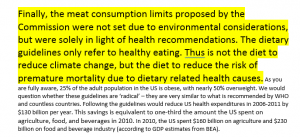
EAT-Lancet’s Environmental Claims are an Epic Fail – and the Commission Knows It
By Frank Mitloehner
The EAT-Lancet Commission’s attempt at establishing a “global planetary health diet that is healthy for both people and planet” was much-anticipated. With a promise like that, it should come as no surprise that the recommendations captured international attention when the study was published in mid-January 2019.
But the excitement around its environmental considerations has fallen flat, at least in circles that rely on science-based evidence to support their conclusions.
By way of background, the “universal healthy reference diet” proposed by the EAT commission drastically reduces the amount of meat – especially red meat – and animal products, giving us something that is about as close as one can get to veganism without being all-out vegan. But it’s not the panacea for environmental health (and quite possibly a far cry from a nutritious diet) that its authors say it is and that it was touted to be by much of the media. Even more, they know it.
Though published in the esteemed journal “The Lancet” the article – some 50 pages long – plays on the myth that changing what we eat can drastically affect the environment. Note to the commission: We’ve been down this road before, and it’s a dead end. Professors Hall and White, among others, have proven that. As I’ve pointed out previously, the disservice of the EAT Commission’s work – the downright danger – is that it leads the public to believe that food choices will drastically affect the climate and the environment overall. It surely has some effect, but nothing close to the impact of burning of fossil fuels! The science behind the environmental claims in the EAT report is sketchy at best and numerous info- and clarification/correction requests have stayed unanswered.
When the study was published, I delved into the report to analyze the science behind the environmental claims. I found numerous incorrect references, and both the methodology and conclusions to be flawed. I raised some questions and finally received this email from Fabrice DeClerck, science director of the EAT-Lancet Commission:

I applaud Dr. DeClerck’s honesty, but it’s a glaring example of too little too late. The much-awaited study of the EAT Commission makes environmental claims that are misleading the public into thinking all one has to do to halt climate change is opt for a veggie burger. It’s a claim that has no basis in science, not even the brand employed by the commission in the recently released report.
Publicly, despite knowing there are errors in the report, the commission is standing by its assertions.
Privately, it’s a different story. The correct one. When will they open up and set the record straight publicly as they have done for me?
